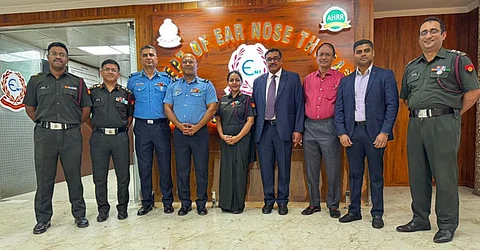

The Army Hospital (Research and Referral) in Delhi has successfully performed a rare and complex auditory brainstem implant surgery on a 1.8-year-old girl, the daughter of a serving soldier. The child was diagnosed with Michel Aplasia, a rare congenital condition characterized by an underdeveloped inner ear and non-functional auditory nerves.
In an official statement released on Tuesday, the Army said, “Army Hospital R&R successfully performed an auditory brainstem implant — a rare, life-changing procedure — on a 1.8-year-old daughter of a serving soldier, diagnosed with Michel Aplasia. This surgery restores hearing in patients where the auditory nerve is non-functional.”
The procedure was carried out by a multidisciplinary team of ENT surgeons, neurosurgeons, neuroanesthesiologists, and audiologists from Army Hospital (R&R), in collaboration with Padma Shri awardee Prof. Mohan Kameswaran and his team. The hospital is now one of the few centers in India to have successfully conducted this advanced surgery.
Earlier this year, in April, Army Hospital (R&R) also announced the adoption of state-of-the-art technologies as part of its medical expansion. Among these advancements was the introduction of a 3D microscope for performing eye surgeries — a first for any Armed Forces medical institution in India.
The hospital’s Department of Ophthalmology has achieved another milestone by performing Minimally Invasive Glaucoma Surgery (MIGS) using the 3D microscope, marking a national first in this surgical approach within the Armed Forces.
This cutting-edge 3D visualization system enhances a variety of eye surgeries, including procedures for squint, cataract, corneal conditions, glaucoma, and retina-related issues. The technology features a 55-inch 4K ultra-HD display and utilizes specialized polarized 3D glasses to provide high-resolution, three-dimensional visualisation for surgeons.
The potential benefits of this system include shorter surgery times, fewer complications, reduced light exposure to the eye (lower phototoxicity), and improved surgical access in complex anatomical situations such as severe kyphosis. Surgeons and operating staff have also reported higher satisfaction levels compared to traditional microscopes.
Through such medical advancements, the Army Hospital (R&R) continues to set new benchmarks in Armed Forces healthcare, offering cutting-edge treatments and life-changing procedures to both serving personnel and their families.